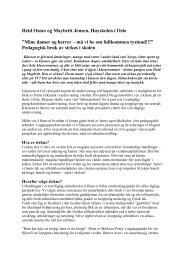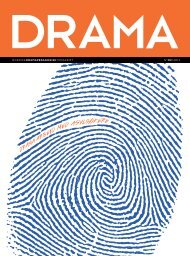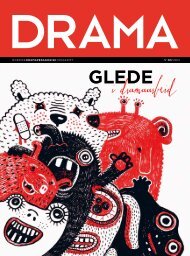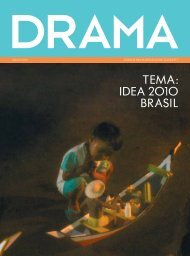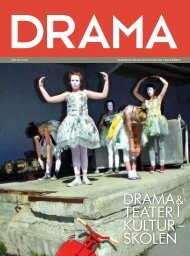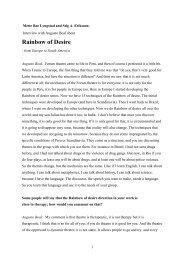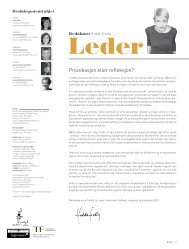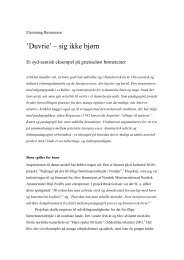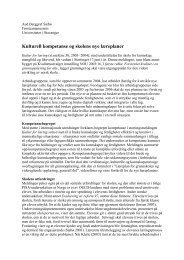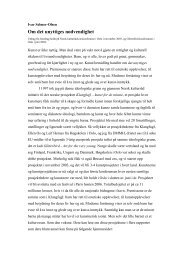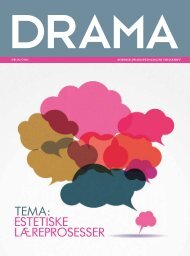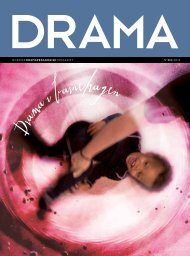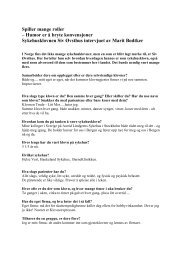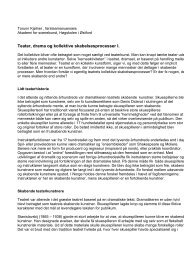tema: drama i grunnskolen - Landslaget drama i skolen
tema: drama i grunnskolen - Landslaget drama i skolen
tema: drama i grunnskolen - Landslaget drama i skolen
Create successful ePaper yourself
Turn your PDF publications into a flip-book with our unique Google optimized e-Paper software.
Drama i[ <strong>grunn<strong>skolen</strong></strong> ]Drama i[ <strong>grunn<strong>skolen</strong></strong> ]Annie Ó BreacháinDrama lecturer at the teacher educationcollege, ‘Marino Institute of Education’in Dublin, Ireland.[ ]One hopes that the vision which afforded<strong>drama</strong> its status as a subject in primaryschools in Ireland will be seen againSoaring andSwoopingtekst: Annie Ó BreacháinDrama on The Primary School Curriculum in IrelandIn 1999, for the first time, <strong>drama</strong> was includedas a compulsory subject on the PrimarySchool Curriculum in Ireland. This articleattempts to expose the reasons for this; toexamine the design and content of the curriculumstatement and to look at the currentstatus of <strong>drama</strong>.It is impossible, of course, to trace the precisefactors which influenced that decision andone is mindful of Sugrue (2004) who notesthe inherently political nature of educationalreform and the sometimes invisible powerrelations which are at play in such processes.Educational Drama in the Broad HistoricalContext. The rich <strong>drama</strong>tic heritage ofIreland is widely recognised and its theatretradition includes an extensive list of internationallyrenowned playwrights. There wasa strong performance tradition across schoolsin Ireland historically with virtually everyschool producing plays to coincide with religiousfeasts at a time when schools were denominationaland managed by the church.In the 1960s, significant changes were takingplace in the field of educational <strong>drama</strong> in theUnited Kingdom and the pioneering work ofDorothy Heathcote and Cecily O’Neill whichplaced greater emphasis on ‘living through’<strong>drama</strong> was gaining momentum ( O’Neill, 1999).The National Curriculum for PrimarySchools published in 1971 (Govt. of Ireland,1971a) was characterised by its ‘commitmentto experiential and environment-basedlearning, to the holistic development of thechild and to the idea of the child as activelearner’ (Waldron, 2004: 211). It recognised<strong>drama</strong> as a methodology but also credited<strong>drama</strong>tic activity as being beneficial for entertainmentpurposes; for allowing childrento express their inner feelings and thoughtsoutwardly and for developing intellect andpersonality (Govt. of Ireland, 1971a).This recognition of the importance of <strong>drama</strong>was also evidenced in the practice of teacherswith one third of teachers surveyed in 1986reporting that they used <strong>drama</strong> on a weeklybasis and 44% had brought their classes to atheatre or had invited theatre-in-educationcompanies into the school.The Move towards the Inclusion of Dramaas a Subject. Finneran (2008: 185) providesa chronology of events which he believescontributed to the achievement of subjectstatus for <strong>drama</strong> beginning with a report onthe arts in education published by the ArtsCouncil (Benson, 1979) which stated that<strong>drama</strong> both as a methodology and as an activityin its own right warranted more attention.Three national conferences on <strong>drama</strong>in education were organised between 1987and 1989 which brought prominent international<strong>drama</strong> practitioners to Ireland andin the 1990s, a series of conferences organisedby the National Association for YouthDrama (NAYD), continued to build on thisadvocacy for <strong>drama</strong> (Finneran, 2008).The 1990s saw considerable activity in educationalpolicy and curriculum reform culminatingin the publication of the WhitePaper entitled ‘Charting our EducationalFuture (Govt. of Ireland, 1995:22) in whichthe importance of the arts in education featuredstrongly. In 1998, The Education Actwas signed into law and the following year a‘revised’ primary curriculum (Govt. of Ireland,1999a) was published which sought tomaintain the philosophical underpinningsof its predecessor (Govt. of Ireland, 1971a)but was also influenced by constructivisttheory and by the work of Bruner (1960) andVygotsky (1975) in particular. The introductorydocument to the Primary School Curriculum(Govt. of Ireland, 1999a) states thatit is characterised by its ‘breadth and balance’and by its commitment to the ‘developmentof the full potential of every child’. At atime when spirits were high with a boomingeconomy and when the dominant discoursewas of holistic development; conditions wereripe for the inclusion of <strong>drama</strong> as a subject.John Mc Ardle, the <strong>drama</strong> consultant to theNational Council for Curriculum and Assessment(NCCA), the body charged withdevising the revised curriculum, wrote apamphlet as part of a series produced by theNational Theatre Outreach Programme entitled‘Flying on Both Wings’ (Mc Ardle, 1998)in the year prior to the publication of that curriculumwherein he put forward a theory of<strong>drama</strong> and theatre in education. In this, McArdle examined the kind of <strong>drama</strong> practiceevident in schools and argued that ‘in our educational<strong>drama</strong>, we have moved too far fromtheatre and that so much had been lost thatwe were effectively flying on one wing’(McArdle, 1998: 4). He further criticised the wayin which <strong>drama</strong>s which were neatly packagedand easy to control dominated classroompractice and noted a near absence of spontaneouspractice (Mc Ardle, 1998).Exploring Drama on the Revised Curriculum.The Drama Curriculum, which followedthe publication of this pamphlet, is describedas being ‘improvisational in nature’(Govt. of Ireland, 1999b: 2) As one wouldexpect, in light of Mc Ardle’s comments regardingspontaneity, there is an emphasis on‘ living through a story and making it up asthey go along’ (Govt. of Ireland, 1999b: 6).The content of The Drama Curriculum isdivided into one ‘strand’: ‘<strong>drama</strong> to explorefeelings, knowledge and ideas leading to understanding’and three strand units, or subdivisionsof this primary strand, including‘ exploring and making <strong>drama</strong>’; ‘co-operatingand communicating in making <strong>drama</strong>’and ‘reflecting on <strong>drama</strong>’ (Govt. of Ireland,1999b). Broad objectives under each of thesetitles are outlined which relate mainly to thedevelopment of each of the elements of <strong>drama</strong>:role and character; time; place; action;tension; significance and genre.It is worth examining the extent to whichthe’ two wings’ to which Mc Ardle refers,namely ‘<strong>drama</strong>’ and ‘theatre’, are representedin The Drama Curriculum (Govt. of Ireland,1999b). The following statement takenfrom the introductory piece of The DramaCurriculum seems to equate ‘educational<strong>drama</strong>’ and ‘process <strong>drama</strong>’ and places performanceas something outside of the educationaldomain: “educational <strong>drama</strong> is notto be confused with what may be termed‘performance <strong>drama</strong>’. This idea is repeatedthroughout the document and ‘process <strong>drama</strong>’as defined by O’Toole (1992) and O’Neill(1995) is the only form of <strong>drama</strong> advocatedin the document:This curriculum will not dwell on thedisplay element of <strong>drama</strong> but will rather,emphasise the benefits to be gained fromthe process of exploring life through thecreation of plot, theme, fiction and makebelieve.Drama used in this way is calledclassroom <strong>drama</strong> or process <strong>drama</strong>.(Govt. of Ireland, 1999b)According to Finneran (2008: 244) thesekinds of statements re-open an ‘artificialdichotomy that dominated discourse inthe field and community over the 1970’sand 1980’s that of ‘process’ versus ‘productbased’ <strong>drama</strong>.’ Furthermore, Finneran(2008: 245) wonders how the devaluing ofperformance occurred given the ‘centralityof performance to both the oral, communaland private, literary aesthetic traditions of<strong>drama</strong> in Ireland’.The strong opposition to performance inthe introductory sections of the curriculumstatement is contradicted in the descriptionsof <strong>drama</strong> activities intended to support theimplementation of the curriculum with twoout of four of the activities mentioning performingscenes (See Govt of Ireland, 1999c:71, 88 & 90). Many features typically associatedwith the theatre ‘wing’ are emphasisedthroughout the curriculum statementincluding the elements of <strong>drama</strong> which ‘areas relevant to process <strong>drama</strong>... as they are tothe corpus of world theatre’ (Govt. of Ireland,1999c: 46). There is also an approach toscript outlined in which performing some ofthe scenes developed is advocated (Govt. ofIreland, 1999c: 90).Support for Teachers. A national in-serviceprogramme for <strong>drama</strong> commenced in theacademic year 2006/2007 and comprisedthree days – two facilitated training days andone school-led planning day. Primary schoolteachers were seconded from their schoolsto provide this training. The in-service programmefor other curricular areas includedfurther in-school support from subjectspecificadvisors but this was not availablefor <strong>drama</strong>. The need for support was surelyrecognisable given the fact that this variety of<strong>drama</strong> was an entirely new area for teachers.The Current Status of Drama. There hasnot, as yet, been a review of <strong>drama</strong> in IrishPrimary Schools since it achieved subjectstatus. The dominant discourse in Ireland,however, is of curriculum overload (SeeNCCA, 2010) and the need for renewed focuson literacy and numeracy. As a result,<strong>drama</strong>, along with other subjects which givethe curriculum its characteristic breadth andbalance, have come under attack.Recognising the downward trend in primaryschool children’s achievements in literacyand numeracy coupled with the anticipationof a poor performance in the Programme for12 dr a m a n r .o3 _ 2 o11dr a m a n r .o3 _ 2 o11 13



